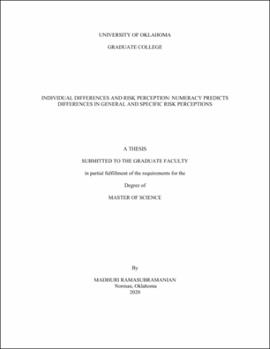| dc.description.abstract | People’s risk perceptions are often related to attitudes and decisions with significant social and economic consequences (e.g., Fischhoff, 2009; Slovic, 1987). In recent years, a growing body of research has demonstrated that personal risk perceptions (e.g., How much risk does HIV pose for you, personally?) tend to be associated with individual differences in numeracy and risk literacy (e.g., the ability to evaluate and understand risk; Cokely et al. 2012; 2018). However, research on the relations between these skills and societal risk perceptions has remained largely unexplored (e.g., How much risk does HIV pose for human health, safety and prosperity?). To address this, I conducted a series of studies. In Study 1, a diverse sample of 17,000+ participants from over 100 countries evaluated five emerging risks for society (e.g., hacking, UAVs). Analyses revealed that numeracy robustly predicted risk perceptions, such that higher numeracy was related to lower risk perceptions, partially mediated by decision quality. In Study 2, participants evaluated various aspects of 39 risks along with numeracy and decision quality. Analyses indicated that numeracy was again related to lower societal risk perceptions both in general and emerging risk categories (e.g., weather, cybersecurity, terrorism). Finally, results from a preliminary study with a sample of 500 U.S. residents collected during the early stages of COVID-19 infections are also presented (e.g., late March 2020; <1,200 reported US patient deaths). This study provided a novel test of a short form assessment of broad societal risk perceptions in general, which were found to mediate the relationship between numeracy and COVID-19 risk perceptions. Taken together, results suggest that perceptions about specific emerging risks to society often reflect differences in more comprehensive attitudes about all risks to society in general, which in turn may reflect differences in general decision making skills (e.g., numeracy and risk literacy). | en_US |
